
We need to expand our team of proofreaders as we aim to increase the rate of republication of Satsvarūpa Mahārāja’s books as well as new books that he writes.
This includes a need for fluent bilingual Spanish and English speakers to proofread Spanish translations (we currently have around 20 Spanish translations waiting to be proofread).
Anyone interested in this particular service should contact Manohara dāsa at [email protected]
If you would like to help, please contact Kṛṣṇa-bhajana dāsa at [email protected] or [email protected] and we will find you a service that utilizes your talents.
. . . “One can chant the Hare Krsna maha-mantra all day and night and never feel tired. As chanting is increased, it will come out new and fresh” (Bhag. 4.30.20, purport).
The quotes from sastra and from Srila Prabhupada’s purports are helpful. Everyone is helping—guru, sastra, and sadhu. The nondevotees in the material world do not help my chanting—”They only wish to do us harm.” But I consort with my nondevotee mind. No sense complaining. I have nothing new to say. I have the work to do.
******
“Srila Visvanatha Cakravarti Thakura quotes this verse from the Padma Purana:
nāmāparādha-yuktānāṁ
nāmāny eva haranty agham
aviśrānti-prayuktāni
tāny evārtha-karāṇi ca“Even if in the beginning one chants the Hare Krsna mantra with offenses, one will become free from such offenses by chanting again and again.”
Papaksayas ca bhavati/ smaratam tam ahar-nisam: One becomes free from all sinful reactions if one chants day and night, following the recommendation of Sri Caitanya Mahaprabhu.” (Bhag. 6.3.24, purport)
******
“Constant” chanting may be taken literally to mean the dropping of all other duties and only chanting. Bhaktivinoda Thakura alludes to the increase:
“Therefore, in the beginning, a little time should be spent in seclusion daily for full concentration upon the holy name. Gradually, as chanting increases, a more profound relationship with the holy name develops, and the material impediments fall away” (HNC, p. 104).
******
In this sense, my retreat has been successful: I have broken through the complacency of a mere sixteen hopelessly inattentive rounds. I have gone beyond it, at least for now. It can easily happen to full-time ISKCON devotees that the chanting of the Hare Krsna mantra gets relegated to a quite- neglected place in their daily sadhana. We work for the movement, but we don’t put time and effort into chanting.
******
Srila Prabhupada has given us a challenge because he expects so much of us in preaching Krsna consciousness within the complicated material world. He assures us that the preacher will be protected by Krsna. He strongly criticizes a follower who gives up the work of preaching and who then sits down full-time in a secluded place for bhajana. But the same Srila Prabhupada has written extensively about the glories of the holy name and the need for devotees to chant nicely and seriously.
******
For Srila Prabhupada, chanting means not only with beads, but lecturing, and of course, kirtana, singing in congregation.
“The members of the Krsna consciousness movement should perform sankirtana-yajnas one after another, so much so that all the people of the world will either jokingly or seriously chant Hare Krsna Hare Krsna, Krsna Krsna Hare Hare/Hare Rama Hare Rama, Rama Rama Hare Hare, and thus they will derive the benefit of cleansing the heart.” (Bhag. 4.24.10, purport)
******
My point is that the japa may be done mechanically, almost thoughtlessly, while thinking of other problems for Krsna’s service—what I have to do today. This leads to other non-preaching, nondevotional thoughts invading the japa time. And the result is that japa, which is the most important of all my daily tasks for the spiritual master, and which will protect me and enable me to perform the other tasks—becomes a “weak sister,” dries up, withers, and effectually dies.
******
It seems that constant chanting on beads is not encouraged by Srila Prabhupada, although he did expect us to be constantly focused on Krsna’s Names and in Krsna’s service. Srila Prabhupada expected sixteen rounds to be enough because he thought the Westerners wouldn’t be able to chant more. That sixteen should never be given up. Srila Prabhupada writes that one who cannot complete his assigned number of rounds is in a diseased condition of life:
“Lord Caitanya’s order is to preach and to become a spiritual master, but in order to do so, one must follow the regulative principles and chant at least sixteen rounds daily. Then, even though preaching in the modern world is very demanding, the preacher will not become contaminated by maya…. If one rigidly observes the regulative principle of chanting sixteen rounds of the maha-mantra every day, his dealings with the material world for the sake of spreading Krsna consciousness movement are not different from the spiritual cultivation of Krsna consciousness. (Bhag. 5.16.3, purport)
pp. 208-12
Today the devotees are gathering hay. Hail is predicted for the late afternoon, so they are racing to get the hay into the barn. The alfalfa, timothy, and wheat stand several feel high and cover thirty acres. A few days ago the ox team pulled the mower which cut the hay and left it to dry. Yesterday the oxen did the tedding, pulling a machine which had what looked like metal fingers that turned the hay over to dry on the other side. Then the tractor came and raked the hay into long rows. Now comes the baling.
Vaisnava drives the large tractor hooked up to an automatic baler. As Vaisnava drives up and down the rows, the baler quickly gathers up the hay, packs it into a fifty pound bale, ties two rows of twine around it, and then throws the bale in a high arc, like a basketball player making a long shot. The bale then lands in a tall wagon hooked up behind. As soon as the big cart is filled, Sri Krsna dasa comes out with another tractor, hooked to an empty cart. He takes the full cart and races back to the barn, followed by barking Dubhi and with six-year old Arjuna riding high on the bales.
Back at the barn, half a dozen men quickly unload the bales onto a conveyor that carries the hay up to the second floor of the barn. The devotees then return another empty cart out to the field.
All this is to provide nutritious feed for the cows. The devotees are pleased to work hard and pull the hay in before the rain comes. Even a single day’s delay can ruin the food value of the hay. Now the barn is loading up with first-class bales.
Most modern writers are agnostics or atheists, but in many cases they never discuss deeply how they have arrived at this important decision. They make a grand apriori assumption that there is no God. They accept Darwinism, secular psychology, atheistic scientism, sometimes seeing the faults in these processes but at last accepting almost as a by-product the conclusion that there is no God. Dogmatists only add to the intellectuals’ disgust with organized religions. But on an individual basis, if you talk to these various atheists, you mostly find a shallow, dogmatic conviction.
“If God is within me, why am I so miserable?”
“If there is God, why is there evil?”
“Did He create cancer?”
Whether posed as genuine doubts or snide jokes, these questions are answered by the ABC beginnings of the Bhagavad-gita. But after wandering through the speculative mazes of universities, or after reading for oneself the great thinkers of Western culture, by the time one gets to the Bhagavad-gita he is spiritually paralyzed and unable to hear Lord Krsna’s words. The Vedic philosophy, therefore, rightly prescribes that we require the extra mercy of the devotee of the Lord, who is even more merciful than Krsna in that he extends to us Krsna’s knowledge by his pure example and his intelligent convictions. Everyone who has come to spiritual life has come in this way. Chadiya vaisnava seva, nistara payeche keba.
You are going to die! Be Krsna conscious! When will you pick up that insight, Mr. Diarist? And if you really knew your death was imminent, would you be content to write of the flowers?
Reply: Death we have heard of, and we see it in others. But living we know directly. Why do we write at all except for the living, those present and in the future? While they have human life, they have the greatest opportunity to hear about devotional service to Krsna. So we write to those sleeping, but living souls, hoping to awaken them. And we write to those already awake and living in the shelter at the lotus feet of Krsna, to encourage them further. To give them sufficient, attractive literature in Krsna consciousness so they don’t think they have to go elsewhere. (And for our own purification we create literature; therefore, it is the kindness of others that they read it and find pleasure in it.)
From a letter by a disciple: “Even if I get a common cold or a stiff neck from carrying my bookbag, I get so affected. Will you tell us at some point later on how you are handling your illness, how you are thinking and praying, how your devotional service attitude remains uninterrupted? Because all of us are going to have to go through this old age and disease and, personally, I feel unprepared to cope with it even when a little failing of health disturbs me so much. Thank you.”
This essay was the first writing Satsvarupa Brahmachary did for the devotees. It was mimeographed and displayed in the storefront window at 26 Second Avenue and handed out to interested visitors.
The Vedas address the human population: “O human race, please wake up. Just utilize the opportunity which you now have.” Don’t go on sleeping. The Bhagavad-gita (14.8) declares the state of dullness (tamas):
“It is born of ignorance and deludes all embodied beings. It binds, O Bharata, by developing the qualities of negligence, indolence, and sleep.”
In the essay “Krishna, The Reservoir of Pleasure” Swami Bhaktivedanta states the symptom of the spirit soul is consciousness, and in a lecture he has said, “Sleeping is a waste of time.” So the authoritative view of sleep is that it should be controlled to a minimum. Swami Bhaktivedanta has said six hours in twenty-four is sufficient for sleeping, divided ideally into five hours at night and an hour nap during the day. At any rate, six hours of sleep, no more, and one should be up at least by 5:00 AM—awake. This is the sleeping program for spiritual life.
Sometimes it is very difficult to get up before dawn and to bathe and be awake, and even after taking morning ablutions it is sometimes difficult to stay awake. First of all, you should get up by 5:00. Have someone wake you or use an alarm clock. Once out of unconsciousness, the business of getting up off the floor is sheer obligation. If you can talk sensibly of the necessity to rise early while awake, then you must follow through once you have been awakened from actual sleep—or be faced with the hypocrisy of mouthing spiritual doctrine without living it.
Coming out of slumber and dreams, blinking in the light with a head possessed by tamas —this is like a rebirth, and the best foot forward is to start chanting the holy name—Hare Krishna. What battle awaits you today? Hare Krishna, Krishna Krishna, Hare Hare, Hare Rama, Hare Rama, Rama Rama, Hare Hare.
A bath must be taken, but there is a tendency to then sit down in a quiet place, and on the pretext of reading or composing or chanting, to fall back into sleep, into Krishna unconsciousness. The primary control here is not to allow your eyes to close; it is sometimes hard to keep your eyes open after sleep, but if you close your eyes again and tell yourself that you are not actually going to sleep but that you cannot help closing your eyes—then you’re off into delusion and soon into slumber again. Physically, a snap-to movement can bring you back, but the point is not to get into this back-and-forth struggle of conscious and unconscious dozing. Once wakened you should progress through chanting and a bath—straight into the day’s engagement.
Regulations and guides of spiritual life are meant to ‘help keep you engaged confidentially for pleasing the senses of the Supreme Lord. Naturally, if you go to bed after 10:00 PM it will be difficult to rise before 5 AM. Also, if you eat heavily at night you are giving yourself trouble for rising the next morning.
The early morning hours are like untouched blossoms. Usually, if you can rise by 3:00 AM these hours are quiet and solitary. Something very special and personal can be accomplished by you, for Krishna, in the gift of these early-awakening hours. Poetry or essays worked on in the first hours of dawn benefit by a pure and earnest concentration; you rejoice because you are conscious. Rest assured that five or six hours sleep is sufficient; break through the difficulties of the morning. You soon gain a new flowering for Krishna consciousness—chant extra rounds, read the Ramayana, learn the Sanskrit alphabet—these pre-sunrise hours can see such things accomplished.
There is a general feeling that sleep is ‘sweet.’ That is like saying oblivion is sweet. For a frustrated, unhappy life, the narcotic of sweet sleep is a prime inducement to stay in darkness of ignorance. But we must not think uncontrolled sleep is offenseless and natural; such uncontrolled sleep, which robs us of consciousness, is an indulgence in sense gratification and should be battled against just as you would battle the more obvious forms of illusion such as maya’s “natural” invitation to sex enjoyment. “Enjoy sleep,” Mayadevi whispers seductively, “It’s perfectly all right; you’re hurting no one—who expects you to stay awake?” But we are advising you regulate your unconscious rest to six hours out of twenty-four and avoid all seductive invitations to more prolonged sleeping.
We need to sleep, all right, but similarly we need to try for Krishna. Sleeping is not among the items of perfection in devotional service. To ‘sleep for Krishna’ means to sleep only for the hours required to maintain bodily health.
Krishna teaches in the Gita the beginning of spiritual knowledge is that you are not this body. Your real identity is spirit-soul. But that does not mean that your body is nonexistent, and that when your body is sleeping you are really not sleeping. If that were so, we could sleep and our spiritual bodies would get up and mimeograph Back to Godhead and cook prasadam and spread the mantra and science of Krishna consciousness. All of us are admittedly in a conditioned state. We have to make the best of a bad bargain. The body is our horse and chariot, and we must rise early and be riding before the sunrise. The Lord says:
“Therefore, O Arjuna, just—with full knowledge in Krsna consciousness—you give up everything unto Me, and without any desire for profit, wihtout any proprietorship of result, and without being lethargic, just fight.” (Bhagavad-gita 3.30)
pp. 344-46
My dear Satsvarupa,
Please accept my blessings. I am in due receipt of your letter dated November 16, 1968, and it is very encouraging that Devananda is combating Mr. Jarvis, who is representing Maharishi Mahesh. Yes, in each and every such meeting you should go and challenge these persons, but you must be equipped very strongly with the conclusions of the Bhagavad Gita. In the Bhagavad Gita it is clearly said that the first class yogi is he who has in his heart always the eternal form of Krishna. I could not follow what Devananda said to the Jerry Jarvis when Devananda said that Mr. Jarvis was also worshiping Krishna. It is very good to argue with him, even at the suspension of meetings, and it shows very good enthusiasm.
Your question: “Is it to be understood that once the yogi sees the Narayana form, his desires for travel and material perfections cease (as did the desires of Dhruva Maharaj)? Or do the yogis still persist in desiring to do wonders even after seeing the Narayana form? You say in your essay ‘Super Consciousness’ that the topmost perfection is to see Narayana’s form and take dictation from Him. In short, the question is, is it true that the yogi who is traveling to planets and performing siddhis has never seen Narayana?”
Dhruva Maharaj was a devotee. The yogis are not devotees. They are, more or less, after some material perfection. But generally, one who sees Narayana, he becomes a devotee. And sometimes such devotees, before entering the supreme abode of Krishna or Narayana, they want to see some of the wonders of this material world. Just like I have come to your country, and I have no interest for sight-seeing, but my main business is preaching Krishna Consciousness; but still, when I go to a new place, sometimes devotees take me to some important sight-seeing place. Similarly, a yogi after becoming a devotee sometimes goes to other planets also, and Narayana fulfills such material desires. In other words, a devotee, even if he wants to fulfill some material desires, he is given the chance by the Lord; but a pure devotee, who is in a higher status, does not desire like that. A pure devotee does not care for any siddhis.
I am glad to learn that Jadurany is feeling a little better, and I hope you will take proper care for the girl. I understand that Govinda dasi has recommended Jadurany to take iron pills, and almost all the girls here are taking them. It is compensating the deficiency due to their past habit of meat-taking. This is a good recommendation.
Hope this meets you well.
Your ever well-wisher,
A.C. Bhaktivedanta Swami
Prabhupāda described that in less than a second, we can go to Vaikuṇṭha. We don’t have to take a slow train on which the conductor announces, “Now passing Janaloka! Take a look outside! Anyone want to get off?” We don’t have to become anxious, “Oh no, I hope I don’t get attracted to this place!” When we leave our bodies, we can go at once to Kṛṣṇa. Some yogīs, however, even while in their bodies, develop powers to travel to other planets. Looking at different places they consider, “This is a fabulous place. I’ve always wanted to see what the demigods on Mount Meru are like.” Even though liberated and eligible to go back to Godhead, some devotees still want to see the varieties in the material universe. The pure devotee doesn’t want to visit other planets. He surrenders exclusively to Kṛṣṇa and he goes to Kṛṣṇa.
The devotee goes past all higher planets, through all subtle existences—through the layers of earth, water (which is ten times thicker than the layer of earth) fire (which is ten times thicker than water), air, ether, and so on (each layer ten times thicker than the preceding one), crosses the Virajā River, through the Brahmajyoti, past the Vaikuṇṭhas, and stops only at the lotus feet of Kṛṣṇa in Goloka Vṛndāvana.
pp. 87-88
When we chant in the temple we are one family. I cry out “Srila Prabhupada ki jaya!”not caring what outsiders think, such as sociology professors with their vertical and horizontal community theories, or those who would minimize the place of Prabhupada. If I cry out, “Srila Prabhupada ki jaya!” it may not accomplish everything, but it helps. And it helps to jump up and down in the kirtana hall, karatalas gripped tightly in hands, clanging rhythm, glancing happily at other devotees and forgetting, “What’s for breakfast?” or “I am sick,” or “I am not happy so don’t try to make me smile like a fool.”
Time limit: I keep glancing at the clock because if the kirtana is too long, then the lecture will start late, and then I may be late for breakfast, and then lunch will follow too soon. . . . In other ‘words, kirtana in my opinion, shouldn’t be very long.
Body limit: Feet hurt, and of course, any exertion may threaten my head. Bodyaches signal to the mind, “Don’t get too much into the kirtana. And be careful to preserve your voice.”
Mind limit: If the kirtana leader tries too aggressively to involve me, I resent it. I like to be close to them, but not too close. The mind doesn’t allow the pure self to relish the name—it rejects-and-accepts, mulls and wishes, backwards and forwards.
Getting in close together, standing around the microphone, happy in kirtana. I can’t describe the inside of kirtana, I can only submit an externalized after-the-fact report: “I took part enthusiastically in kirtana.” It is inexpressible, not because my experience of the bliss-ocean is so deep, but because even a drop of kirtana-rasa is beyond external mind and words. While chanting and dancing we receive darsana of the Deities. They also are not external, although we see Them. Internal means “O Supreme Lord, You are my master. I am Your servant.” Kirtana-rasa means everything is all right.
Some senior devotees walk out if the kirtana endures for more than ten minutes. Those who stay and chant, are they the simple devotees? Those who get restless and have to leave the kirtana hall for business, are they the responsible men?
Induce the little boys to dance, push the eccentric brahmacari who stands motionless as if he is in another world, and what about those staid grhasthas hanging way in the back as if kirtana were for ruffians? Never mind improving the others, just surrender yourself, your feet, ankles, arms, head, heart—get in there!
pp. 337-40
My dear Lord Krsna and Prabhupada, I want to be your devotee. I want to wake up and do the right things. I want to do what you want me to do. But I am already going in a direction which is, I suppose, the direction of my own will, and I’m trying to dovetail that into acceptable devotional service. Please help me to satisfy you in that way. If the service I’m attached to is really not Your will for me, please let me know clearly. Otherwise, I will continue to try to please You by the service I am doing. But that service also is imperfect, so please improve it, and let me do something humbly that is helpful to the movement.
I may have my plans, like the forest school, and my claim to be working at prayer and inner life, and my responsibilities as initiating guru to guide disciples, but if these activities should be abandoned instead of perfected, please let me know. You will have to do this in a way which I can understand. I am too much set on my own ways, and I am not able to see them as totally wrong ways. Only You can enable me to see.
My Lord, this prayer is also made insincerely. It is merely clever and literary. But I hope my intention to address myself to God and guru is not so far off the mark that You do not even hear me.
I am Your servant,
Gauracandra dasa Swami
Crooked, scarred tree near the cabin:
I noticed him when we first arrived. He had been chopped at a few times. He is as broad as a telephone pole, and taller than that, but his trunk also grows crooked after about ten feet up. He is not fully branched with pine needles, but is scraggly. Although there are millions of trees here, I can’t meet them all, but he is nearby. For him I feel some of the pity and wonderment for souls in the bodies of trees. Srila Prabhupada has said that one gets the body of a tree as a result of extreme lust. His punishment is that he can’t move and stands naked.
If a person comes to harm the tree it can’t protest or go away. It is also very sinful to cut down trees for producing sense gratification newspapers and magazines. In the past, I have seen loggers destroying acres like these in the mountains, felling in a matter of moments by chainsaw a tree which took hundreds of years to reach its’ stature and dignity in nature. As for the nearby scarred and crooked fir tree, he provides niches for many jays. Without him and his nearby brothers, I also would feel more desolate. Imagine, if when I looked out all I could see was barren rock or sand and dirt. It would tend to make the heart morose.
I do not wish to be holier than thou when I pass you, scarred tree, or to scorn you because of your sinfulness. As spirit soul, I am not better than you.
Although you are silent, you convey to me the message that the proper use of human life is to escape becoming either a tree or once again a misled human being. May our daily chanting of the holy names of Krsna penetrate your coverings of bark and your concentric circles of trunk, which obscure the pure soul lodged within.
I know you are tolerant, brother tree. I am no wonder-worker or great saint who can reach you as spirit soul. But at least I can recite here thoughtfully a prayer that you may know the Lord and accept my own respect for your right to live in God’s wilderness. He is great, the Lord of all, and He desires to release us from all our reactions to misdeeds. He simply wants us to turn to Him and recognize that we are His lost but loving servants. He wants us to understand Him and begin to do whatever we are doing for His sake. And that can be done even in the forest and even—as recorded in Vedic literatures—by the trees.
Fir tree, our chimney smoke
blows past you in the alpine
wind. The calendar says spring,
but it’s an Arctic air that blows
from the North.
I am not far away
from the Supreme Lord’s presence:
“Of purifiers I am the wind.”
Crashing through the forest, is
the wheel of birth and death.
It’s up to me to reach
Vaikuntha by a pure God
consciousness that sees right
through the sky and rock.
Like a drinking cup,
I can receive clear water
and thank Him.
Because I am not dead,
I can make the choice.
pp. 57-63
I melted in the sauna. The doctor told me come out if I felt discomfort, but I endured the full time. Hot intake of breath through nostrils. A happy moment this morning was when the attendant was spraying warm water from a pressurized hose at me to wash off the caked-on mud. I helped by pushing it off with my hands. It felt like a ritual—I was shedding a dirty covering. Wish it were that easy to wash dirt off the soul.
******
William Carlos Williams said all that he is interested in is the moment that one experiences alone and in conveying this. Well, yeah. But I need to keep practicing all day, not just honing away at one spare poem of divided lines until I “get it right.”
Knock on my door—
“I’m ready for you …” I’ll
singsong, you’ve broken my spell.
But I’ll answer your call and
accept the ginger tea,
the time clock—
me, the servant of this
Nature Path Health clinic.
Tell me what
to do next,
and in my own thoughts
kept to myself, I
ruminate
this
happiness sought
in present Krsna conscious
—who I am and
what I can write.
******
Yoga on hard floor. Confer with M. about it. I have not confided in him about my writing. It’s my own world and yours, you who read this.
“I have not made the best use of a bad bargain,” said M. A car gets taken in for regular servicing, and you use the right fuel, give it oil, and don’t overload its springs or drive too much over the speed limit. If you put sugar in your body, or more than you can digest, and don’t give your digestion a rest, you’ll be forced to check into a “garage” like this one.
Knock! Knock! Knock! I wonder if their knuckles ever get sore. My ears certainly do. Which one of us is the servant? They get their revenge in that loud knocking.
******
Dreamt that Jimmy Carter was speaking mostly to a children’s audience. He told them that his ox team and cart were one of the greatest joys of his life. He said he was sorry he had to give them up. The devotees in the audience were delighted to hear this—this was more than we ever could have expected.
It’s war! So many mosquitoes! They come at me with their engine-like whine. I hear it and swing my hand to chase them.
******
It’s almost 6 A.M.
when the phone rings
and the bus goes by.
We will go out and see
rosy-colored clouds in the
tropical sky and walk
the sandy path in saffron—japa.
******
But where is inspiration? It eludes me this morning. Lenny Bruce on stage in East Village Theater—I don’t wish to remember it. I don’t want to range over anything other than Krsna, but not only that I read in the Caitanya-carit?m?ta as if it were a newspaper and I’m getting the news.
******
It’s ten past six, and the phone hasn’t rung yet;
no lemon drink delivered. Basho said,
the first snow is barely
enough to bend the branches
of the jonquil tree.
Here, the ladies
sweep up the day’s fallen
palm leaves.
We are far away from
Vrindavana.
Ticky-tick, confirmed.
******
Written in the prayer hall-gymnasium while waiting to see the doctor:
Lord Caitanya has a bargain
for ants
for humans:
just chant Hare Krsna.
I can only take so much
health talk. I’m already sick
of it.
I’d rather talk of Krsna or
even of the electric fan,
the funny face of the girl next door
and the rest, something
to loosen me,
but I can only take so much
health talk—
pontification about the pancreas.
Purusottama, Lord of all,
dear Guru, please
let me
let me
learn what I
must learn, although I’m afraid to ask,
“Give it all to me now.”
You know this—
You know all—
please take me to You.
Take away the
stones I carry that
weigh me down, my
misconceptions and false possessions,
my ego.
******
Mudpack bliss. Warm water from the hose washing off caked dried mud which has pinched the skin. It feels nice to be standing on Mother Earth. Sunshine of a South Indian winter at noon dapples through palm trees.
While still caked with mud, I spoke further with Madhu about free will and surrender. In Bhagavad-gita 18.63, Krsna tells Arjuna that he can do as he likes. When we have not yet decided to surrender, that statement leaves us our free will. Is that less advanced than when Krsna orders, “Surrender” in 18.66? Later, beyond “Surrender, you rascal!” is the flowering of spontaneous initiative in acts of love. “Would Krsna like to eat lunch? What shall I serve Him?
Oh, what were you thinking of,
Sats, when you were encased
in mud? I was thinking…
uh… that the sun was nice
and warm and uh… maybe I
could write better.
You call that meditation?
pp. 54-57
Memories are as rich as loam. I remember one time after the GBC meetings in Mayapur, some of us were in New Delhi together. We had rented two rooms in an inexpensive hotel. Rupanuga Prabhu was there, and Balavanta Prabhu. We all felt a nice sense of dutifulness after the meetings and we were eager to return to the West. I think this was in 1975.
I especially remember Rupanuga discussing how we should be preachers. We were all based in temples, so he said that when people come to the temple, we should be anxious to go forward and speak to them about Krsna. We shouldn’t get bogged down behind our desks as temple administrators. The real life of Krsna consciousness —the secret of existence itself—was this great gift Prabhupada had given us to preach to whomever we met.
We all wanted to do it. Rupanuga gave a crude analogy: just as a prostitute eyes a man and thinks how to entice him as a client, so we should look upon people as prospective candidates for Krsna consciousness. I also remember Balavanta’s enthusiasm.
Those particular men would really stress whatever they were into. So many of my Godbrothers were like that—Bhagavan, Ramesvara—strong men. When they felt that something should be done, they not only felt it personally, but advocated it for the whole society. In this case, I felt the thrill of Rupanuga’s words and the happiness we all felt of having our own turf in the U.S.A. in which we could preach. It felt so good to be going back after our yajna in India, not to some material family, but to the field Prabhupada had given us.
The inspiration of this meeting was that they were talking about it as if it were a new discovery. Maybe by our enthusing each other and then keeping in touch we could devise different preaching strategies. We made plans, although it basically came down to a personal sense of being alive as devotees, as preachers, and a readiness to follow Lord Caitanya’s order to the Kurma Brahmana: yare dekha, tare kaha krsna-upadesa, be ready to talk to anyone and be inspired to influence that person to become Krsna conscious. That is the way of divine life.
I have a mental image of Steve Guarino, my father, standing outside the storefront at 26 Second Avenue and waiting for me. I can’t remember exactly why he was there—it doesn’t fit in with some of the chronology of my becoming one of Swamiji’s followers—but I do remember that once I had met Swamiji and taken to the practice of Krsna consciousness, I called my parents on the phone and told them about it. That’s when they told me they would have nothing more to do with me if I pursued Krsna consciousness. I told Prabhupada about the conversation and that seemed to be the end of my relationship with them outside of a few more phone calls.
Somewhere in that history, my father and I made arrangements to meet and spend a few hours on Manhattan’s Lower East Side. I think we even went to a nearby Italian restaurant for dinner.
I don’t remember so clearly what happened. I just remember walking south on Second Avenue toward the storefront and seeing my father standing outside, waiting for me. He was about five foot seven and he was in good shape, although he weighed about 200 pounds. He was a stocky man, rugged-looking, a man who prided himself for his strength and courage. He was wearing a fedora, which, although conservative, had a sporty touch—maybe a colored feather. I can’t remember if it was summer or winter. If it was winter, he would have been wearing a hip-length car coat, and if it was summer, he would have come in a suit jacket without a tie.
All I can remember is the mild sense of shock I felt that he actually came. It was such a strange juxtaposition to see him at the storefront. I was already twenty-six years old and firmly established in who I was. Meeting with my father didn’t have the same power to shake me as it had in the past. I had already weathered most of those storms, at least on the conscious level, years earlier and followed my hip life despite their protest. I doubt they were even aware how much I was indulging in LSD and marijuana.
Suddenly, I was following Swami Bhaktivedanta, and although they were opposed to that too, I was an adult, a case worker in the Welfare department, old enough to do my own thing. Were we trying to make peace at this meeting?
My father said that he had been invited into the storefront by one of the devotees, but he had told them he preferred to wait outside. He didn’t say this critically; he sounded amused and friendly.
It’s strange that that’s all I remember about this meeting. I guess it’s not much of a memory, but it was the last time I saw him. It was 1966. Only last year, 1995, did I learn while reading a letter from a friend that my father had died of a heart attack in Philadelphia in 1987 at the age of seventy-eight.
This shred of memory intrigues me because it feels like a juxtaposition of my father with Srila Prabhupada. Where was Prabhupada when my father visited? Was he upstairs?
pp. 93-96
You need to write to keep in shape. You need to shape to keep in write.
Is your mother and father alive?
Yes. Don’t ask me where.
And what about self-sufficiency? What is the use of your artwork if the earth falls? How will you buy groceries with your writings?
Tell us, what are you doing that is useful?
I say I am a roller-coaster blues man. Sing to God. God in one person, blessed Trinity.
Tell us, tell us I am writing this to pass the time. Before two hours, then we will go, gone and driving to a house where we will stay thirteen full days, if you count the last day as regular.
I ask you please be enthusiastic and keep working at art and writing and hearing too of Krsna and Prabhupada. Don’t lose the taste, spark.
If it gets dry, keep working anyway. Love thy neighbor. Draw to your heart’s content.
As long as you have a thumb and finger and brain that works, tie a marker, pencil, crayon onto it or spray can, and splash a poster board.
You could be right now reading Tenth Canto. You are doing this farewell to Sridama’s house writing session. Mostly for the next month I will be doing free-write books to get through the summer. The prospect is good.
Mange, mange—eat, eat.
The table is littered with bread and stained white cloth with wine. Guarinos have pushed back their bellies from the table and belching and munching on fruit and walnuts and now the skit put on by the kids. Big gatherings of families in Brooklyn in late
1940s and early ’50s, those days.
Those were real relatives, huh? Real uncles and
cousins and sometimes someone with accordion and
black face with burnt cork.
O Stevie, you, you
don’t call me bad name
I’m the same guy who is
now honorable Vaisnava
sannyasi. Don’t call me
bad names and I won’t call
you one.
I’ll shut up
I’ll chant Hare Krsna.
The cicadas. The door. It opens and M. enters. We have two hours to go here, so it’s no wonder I write a WS. But mates, don’t forget “sit properly.” Srila Prabhupada says if you could chant through an afternoon without jokes or irritated and restless
that would be good
fondling holy names
and beads
and praying please reveal
Yourself to me,
let me at least stick to
it, the chanting.
He asked me why do we have to be so rigid about sixteen rounds? I say it’s the bare minimum. We want to fix the mind on Krsna. They don’t understand. I don’t either but at least a little. They are so far from this. Think of Krsna.
He says, “But my wife doesn’t have time with the kids.” Be patient, I say. He wants me to say explicitly, “She doesn’t have to chant sixteen. Just do whatever you can, it’s all right.” He knows I can’t say that but thinks it’s just a rigid policy of mine. One should say the truth, “I can’t chant sixteen rounds, but I like to chant and I would if I could.”
I say I accept disciples who don’t chant sixteen but you can’t expect me to lower the quota. It’s vaidhi-bhakti. It’s the bare minimum.
Grhasthas take over. Say, “You sannyasis have ruled ISKCON too long on your standards, and neither do you even follow those standards yourselves. But you pontificate.”
So they are defining a broader level of Krsna consciousness and not the hard-line.
You know, WS reader and writer, it’s not so important that you write it here; just keep the hand moving.
Practice the cello, the bow and string. I don’t really care so much. I have to do something, say something, embrace someone, be something. I can’t just be a non-entity. I heard sound like a piano, maybe “Krsna Vision” type music. Go to window and hear what it is. Could it be classical music? It’s someone playing like practice although they’re not so great.
Oh listen, the crickets, the summer crickets and locusts are singing this hot afternoon exactly July 15, that summer in Italy. They are running up and down the piano scale. It sounds now like classical music.
That’s very nice. Fortissimo. Not blues. The masters replayed. Fingers are dancing on the keys. That person is really going at it. Reminds you typed on LSD, the LSD madness, and out came the crying voice of a woman complaining of unfaithfulness of lover, it’s what you actually heard or picked up from the piano playing in the next room while you typed.
Gave yourself to it, became an instrument to record it. Well, they say, Srila Prabhupada wrote like that and Lord Krsna spoke through him. I’d like to be able to write some brilliant Krsna conscious piece. So for you to be the instrument means to come through you when you put in your own two cents and impurity.
Krsna, Krsna, I say the time will come when good pages will issue forth. The free-writes will yield Krsna conscious nectar pouring from you, the story of Syamantaka jewel and your disciples’ broken hearts
to rise above the modes
we all want the best
have different angles how to do it in this movement.
You’ll be able to write all these voices coming through you. You refrain from fiction and out comes the blended voices like that sweet song and expert scales running over piano
and someone will say Sats plays good and is that what you want?
Throw him a bone
give an honor
an official permission
to live in houses and write
whatever comes and make these nice books.
So far he has to write when he can while leading the life of a sannyasi traveling. He tells the truth he knows, gives vent, expresses, writes down but with best access to inner truth.
Okay, Prabhupada’s teachings and I repeat. That’s basically what I want in “new” voice, old wine in new bottles, ink on hand, on nose, tricks up sleeve, it won’t be long now. All your plans will unfold and with wan smile on face, as if amused by it or scared by it, you’ll face your end.
it may occur to you then how you lost out,
tried his best give him a medal on deathbed
but we can’t ease blows,
organs in the body break down
and whatever you can tell, tell it now and call on your master.
I used to write one-hour WS, but now I’m lucky if I can do a half-hour. Dictate this one and then try to read until 3 P.M. Then sit around, sit with beads or without and then go.
(Half-hour, Sridama’s house, July 15, 1995)
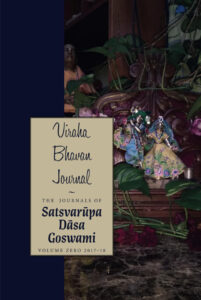
Viraha Bhavan Journal (2017–2018) was written by Satsvarūpa Mahārāja following a brief hiatus in writing activity, and was originally intended to be volume 1 in a series of published journals. However, following its completion and publication, Mahārāja again stopped writing books, subsequently focusing only on what became his current online journal, which began in August of 2018.
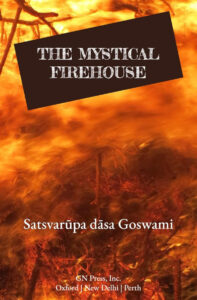
At first, I took it hard that I would have to live surrounded by the firemen, and without my own solitude. After all, for decades I had lived in my own house with my own books and my own friends. I was also now a crippled person who couldn’t walk, living among men who did active duties. But when Baladeva explained it to me, how it was not so bad living continually with other firemen and living in the firehouse with its limited facilities, I came to partially accept it and to accept the other men. I came to accept my new situation. I would live continually in the firehouse and mostly not go outside. I would not lead such a solitary life but associate with the other firemen.
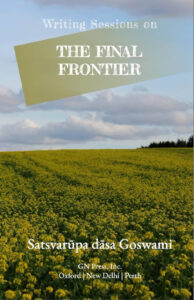
Let me write sweet prose.
Let me write not for my own benefit
but for the pleasure of Their Lordships.
Let me please Kṛṣṇa,
that’s my only wish.
May Kṛṣṇa be pleased with me,
that’s my only hope and desire.
May Kṛṣṇa give me His blessings:
Kṛṣṇa Kṛṣṇa Kṛṣṇa Kṛṣṇa Kṛṣṇa he
Rāma Rāghava Rāma Rāghava
Rāma Rāghava rakṣa mām.
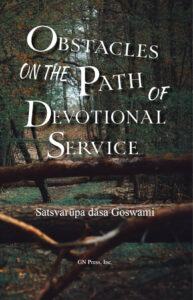
You mentioned that your pathway has become filled with stumbling blocks, but there are no stumbling blocks. I can kick out all those stumbling blocks immediately, provided you accept my guidance. With one stroke of my kick, I can kick out all stumbling blocks. —Letter by Śrīla Prabhupāda, December 9, 1972.
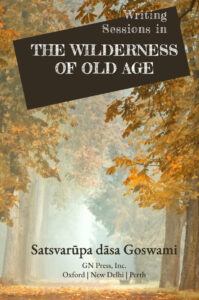
The Writing Sessions are my heart and soul. I’m trying my best to keep up with them. I am working with a few devotees, and they are far ahead of me. I wander in the wilderness of old age. I make my Writing Sessions as best I can. Every day I try to come up with a new subject. Today I am thinking of my parents. But I don’t think of them deeply. They are long gone from my life. Śrīla Prabhupāda wrote a poem when he was a sannyāsī, and he said now all my friends and relatives are gone. They are just a list of names now. I am like that too. I am a sannyāsī with a few friends. I love the books of Śrīla Prabhupāda. I try to keep up with them. I read as much as I can and then listen to his bhajanas.
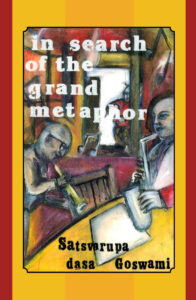
The metaphor is song. Explain it. Yes, particulars may not seem interesting or profound to readers who want structured books.
Wait a minute. Don’t pander to readers or concepts of Art. But Kṛṣṇa conscious criteria are important and must be followed. So, if your little splayed-out life-thoughts are all Kṛṣṇa conscious, then it’s no problem.
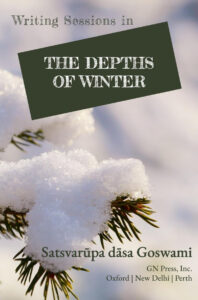
I am near the end of my days. But I do like the company of like-minded souls, especially those who are Kṛṣṇa conscious. Yes! I am prone to Kṛṣṇa consciousness. I have been a disciple of Bhaktivedanta Swami Prabhupāda for maybe almost sixty years. Sometimes I fail him. But I always bounce back and fall at his feet. It is a terrible thing that I sometimes do not have the highest love for him. It is a terrible thing. Actually, however, I never fall away from him. He always comes and catches me and brings me back to his loving arms.

This edition of Satsvarūpa dāsa Goswami’s 1996 timed book, Upstate: Room to Write, is published as part of a legacy project to restore Satsvarūpa Mahārāja’s writings to ‘in print’ status and make them globally available for current and future readers.
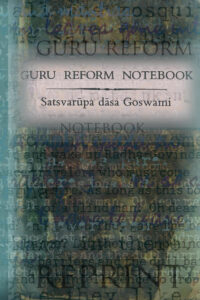
A factual record of the reform and change in ISKCON guru system of mid ’80s.
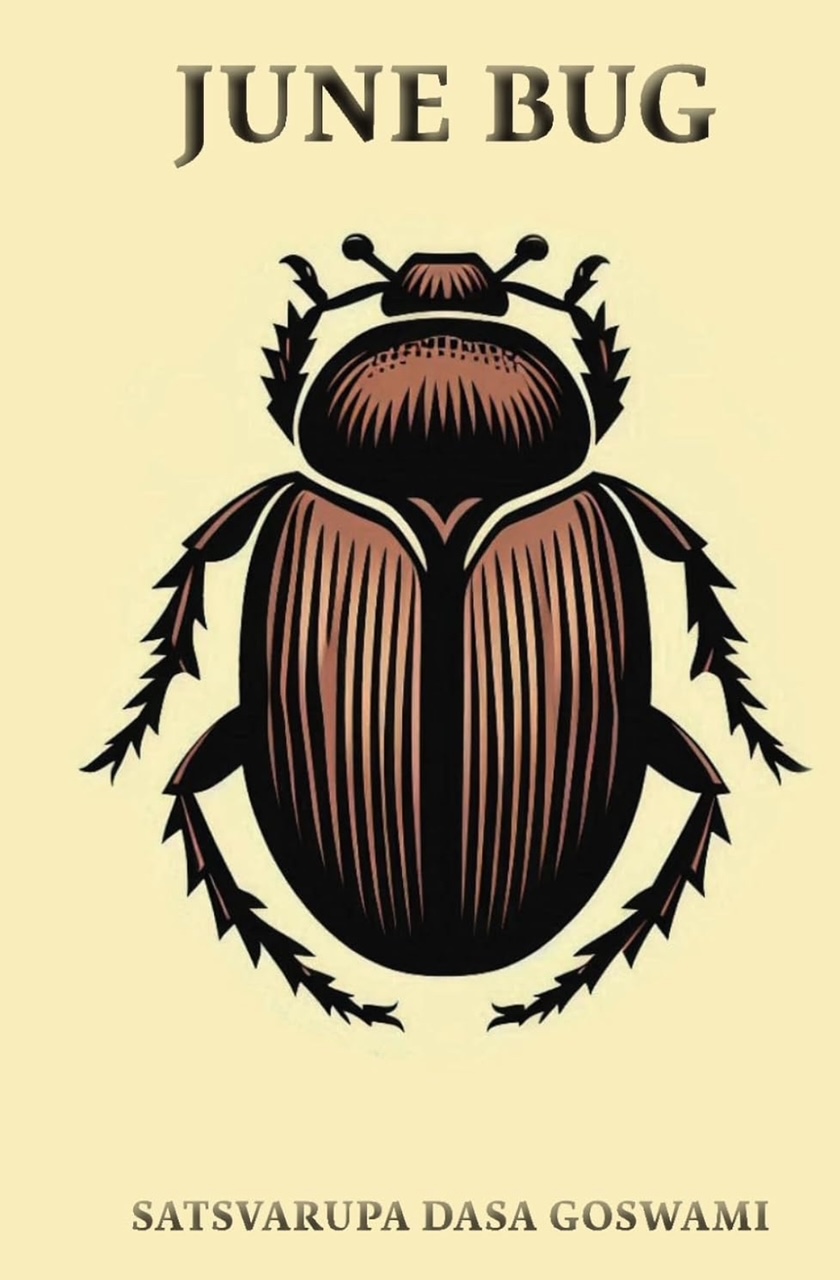
Readers will find, in the Appendix of this book, scans of a cover letter written by Satsvarūpa Mahārāja to the GN Press typist at the time, along with some of the original handwritten pages of June Bug. Together, these help to illustrate the process used by Mahārāja when writing his books during this period. These were timed books, in the sense that a distinct time period was allotted for the writing, during SDG’s travels as a visiting sannyāsī
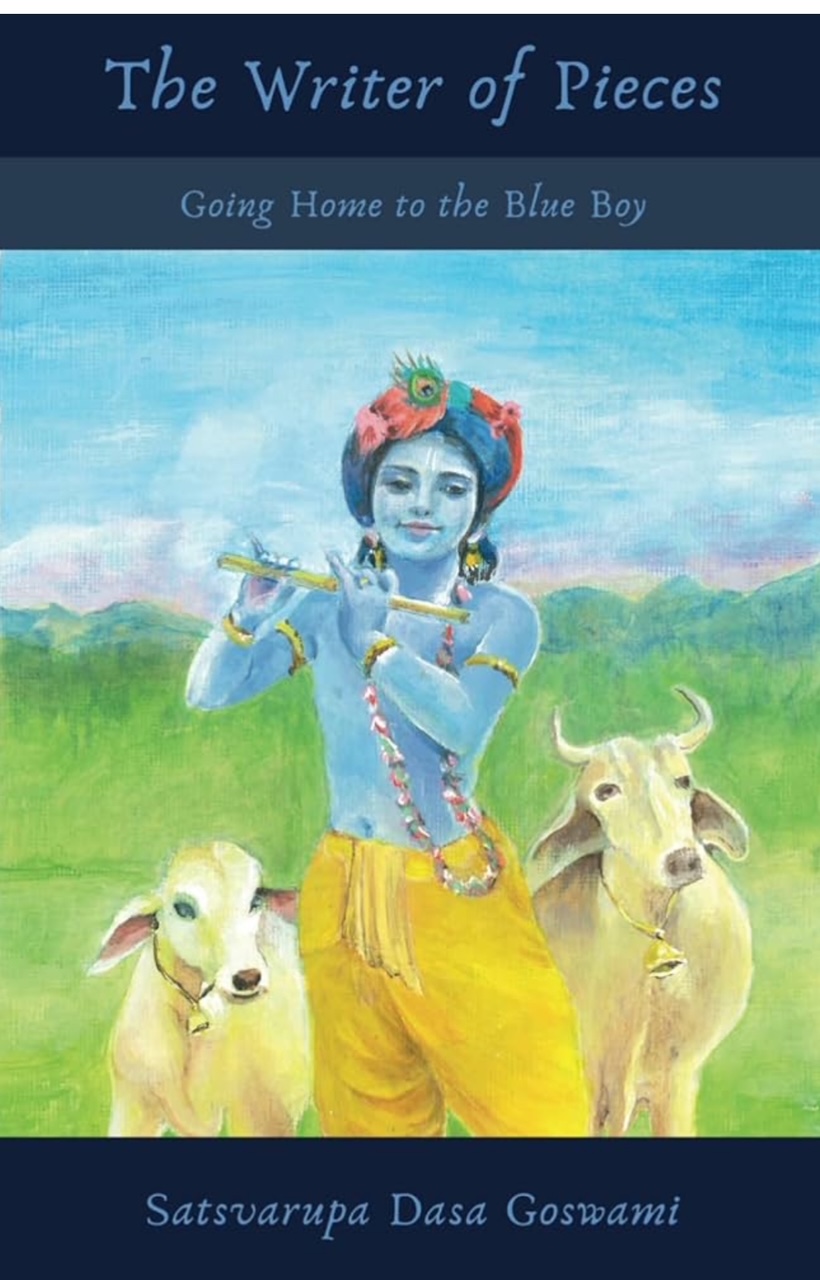
Don’t take my pieces away from me. I need them dearly. My pieces are my prayers to Kṛṣṇa. He wants me to have them, this is my way to love Him. Never take my pieces away.
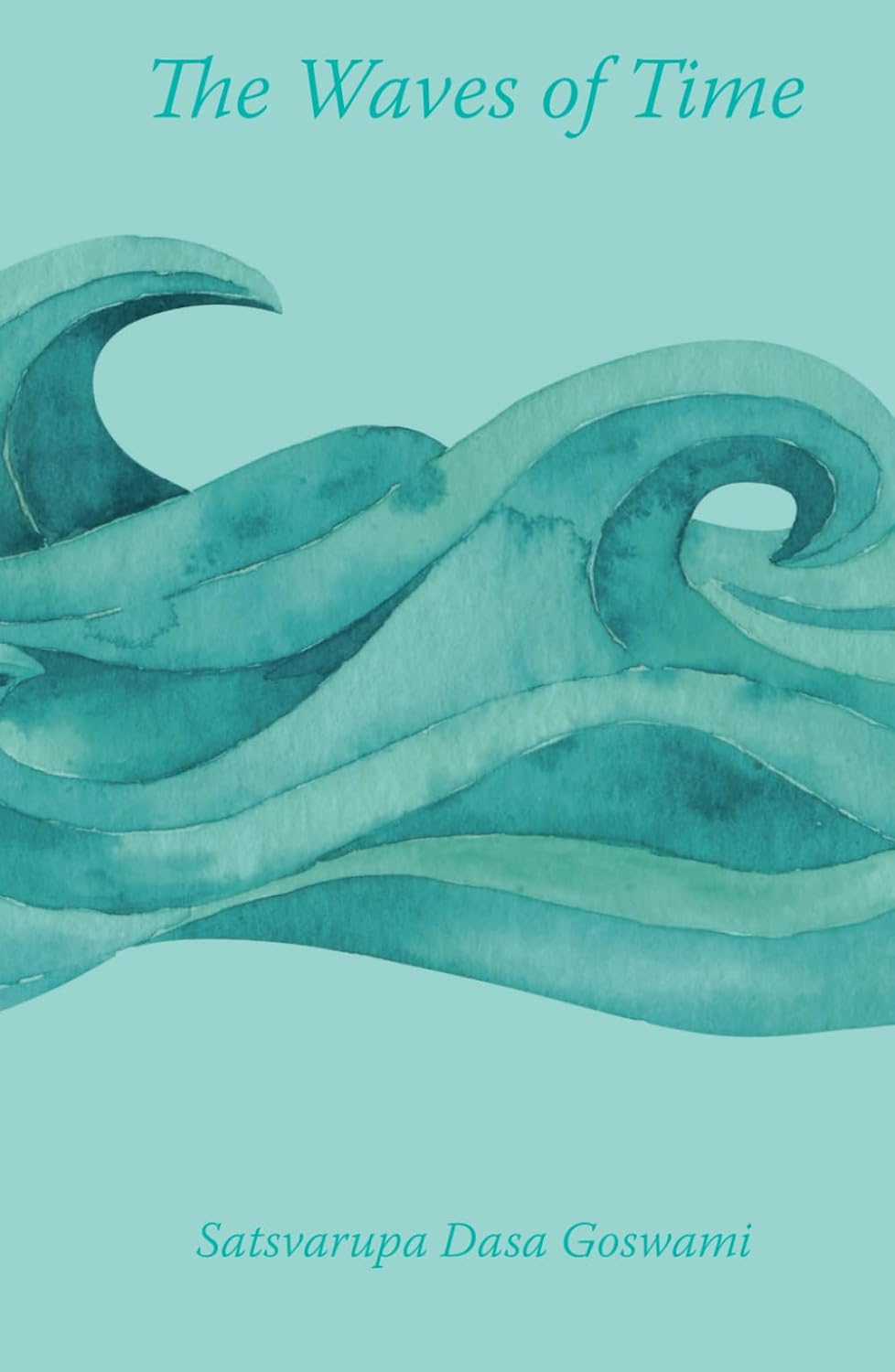
Many planks and sticks, unable to stay together, are carried away by the force of a river’s waves. Similarly, although we are intimately related with friends and family members, we are unable to stay together because of our varied past deeds and the waves of time.

To Śrīla Prabhupāda, who encouraged his devotees (including me) To write articles and books about Kṛṣṇa Consciousness.
I wrote him personally and asked if it was alright for his disciples to write books, Since he, our spiritual master, was already doing that. He wrote back and said that it was certainly alright For us to produce books.

I have a personal story to tell. It is a about a time (January–July 1974) I spent as a personal servant and secretary of my spiritual master, His Divine Grace A.C. Bhaktivedanta Swami Prabhupäda, founder-äcärya of the International Society for Krishna Consciousness. Although I have written extensively about Çréla Prabhupäda, I’ve hesitated to give this account, for fear it would expose me as a poor disciple. But now I’m going ahead, confident that the truth will purify both my readers and myself.

First published by The Gītā-nāgarī Press/GN Press in serialized form in the magazine Among Friends between 1996 and 2001, Best Use of a Bad Bargain is collected here for the first time in this new edition. This volume also contains essays written by Satsvarūpa dāsa Goswami for the occasional periodical, Hope This Meets You in Good Health, between 1994 and 2002, published by the ISKCON Health and Welfare Ministry.

This book has two purposes: to arouse our transcendental feelings of separation from a great personality, Śrīla Prabhupāda, and to encourage all sincere seekers of the Absolute Truth to go forward like an army under the banner of His Divine Grace A.C. Bhaktivedanta Swami Prabhupāda and the Kṛṣṇa consciousness movement.

A single volume collection of the Nimai novels.

Śrīla Prabhupāda was in the disciplic succession from the Brahmā-Mādhva-Gauḍīya sampradāya, the Vaiṣṇavas who advocate pure devotion to God and who understand Kṛṣṇa as the Supreme Personality of Godhead. He always described himself as simply a messenger who carried the paramparā teachings of his spiritual master and Lord Kṛṣṇa.

Dear Srila Prabhupada,
Please accept this or it’s worse than useless.
You have given me spiritual life
and so my time is yours.
You want me to be happy in Krishna consciousness
You want me to spread Krishna consciousness,

This collection of Satsvarūpa dāsa Goswami’s writings is comprised of essays that were originally published in Back to Godhead magazine between 1966 and 1978, and compiled in 1979 by Gita Nagari Press as the volume A Handbook for Kṛṣṇa Consciousness.

This second volume of Satsvarūpa dāsa Goswami’s Back to Godhead essays encompasses the last 11 years of his 20-year tenure as Editor-in-Chief of Back to Godhead magazine. The essays in this book consist mostly of SDG’s ‘Notes from the Editor’ column, which was typically featured towards the end of each issue starting in 1978 and running until Mahārāja retired from his duties as editor in 1989.

This collection of Satsvarupa dasa Goswami’s writings is comprised of essays that were originally published in Back to Godhead magazine between 1991 and 2002, picking up where Volume 2 leaves off. The volume is supplemented by essays about devotional service from issues of Satsvarupa dasa Goswami’s magazine, Among Friends, published in the 1990s.

“This is a different kind of book, written in my old age, observing Kṛṣṇa consciousness and assessing myself. I believe it fits under the category of ‘Literature in pursuance of the Vedic version.’ It is autobiography, from a Western-raised man, who has been transformed into a devotee of Kṛṣṇa by Śrīla Prabhupāda.”
 The Best I Could Do
The Best I Could DoI want to study this evolution of my art, my writing. I want to see what changed from the book In Search of the Grand Metaphor to the next book, The Last Days of the Year.
 a Hare Krishna Man
a Hare Krishna ManIt’s world enlightenment day
And devotees are giving out books
By milk of kindness, read one page
And your life can become perfect.
 Calling Out to Srila Prabhupada: Poems and Prayers
Calling Out to Srila Prabhupada: Poems and PrayersO Prabhupāda, whose purports are wonderfully clear, having been gathered from what was taught by the previous ācāryas and made all new; O Prabhupāda, who is always sober to expose the material illusion and blissful in knowledge of Kṛṣṇa, may we carefully read your Bhaktivedanta purports.

I use free-writing in my devotional service as part of my sādhana. It is a way for me to enter those realms of myself where only honesty matters; free-writing enables me to reach deeper levels of realization by my repeated attempt to “tell the truth quickly.” Free-writing takes me past polished prose. It takes me past literary effect. It takes me past the need to present something and allows me to just get down and say it. From the viewpoint of a writer, this dropping of all pretense is desirable.
 Geaglum Free Write
Geaglum Free WriteThis edition of Satsvarūpa dāsa Goswami’s 1996 timed book, Geaglum Free Write Diary, is published as part of a legacy project to restore Satsvarūpa Mahārāja’s writings to ‘in print’ status and make them globally available for current and future readers.